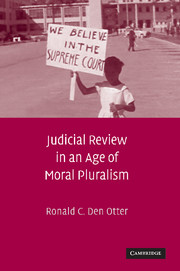Book contents
- Frontmatter
- Contents
- Acknowledgments
- Introduction
- 1 Public Justification and Constitutional Theory
- 2 Freedom and Equality in Constitutional History
- 3 The Challenge of Public Justification
- 4 Competing Conceptions of Public Reason
- 5 Constitutional Public Reason
- 6 The Limits of Public Justification
- 7 Standard Objections to Public Reason
- 8 Easier Cases
- 9 Harder Cases
- 10 The Case for Judicial Review
- Conclusion
- References
- Index
- References
6 - The Limits of Public Justification
Published online by Cambridge University Press: 17 December 2010
- Frontmatter
- Contents
- Acknowledgments
- Introduction
- 1 Public Justification and Constitutional Theory
- 2 Freedom and Equality in Constitutional History
- 3 The Challenge of Public Justification
- 4 Competing Conceptions of Public Reason
- 5 Constitutional Public Reason
- 6 The Limits of Public Justification
- 7 Standard Objections to Public Reason
- 8 Easier Cases
- 9 Harder Cases
- 10 The Case for Judicial Review
- Conclusion
- References
- Index
- References
Summary
In the previous chapter, I spelled out how an exclusive principle of public reason differs from a laissez-faire principle and Rawls's more inclusive principle and showed how it requires people to exercise as much self-restraint as possible when they offer reasons to those who are likely to reasonably disagree with them. I also stressed that following an exclusive principle of public reason is more likely to produce reasons that are more easily understood in a society like our own. In this chapter, I want to shift my focus from those who try to publicly justify public laws and constitutional decisions to those who are asked to accept the public justification in question. Public justification has two sides, and those who care about justifying the most important laws not only give reasons but also receive them. I then explain how a reasonable person should go about determining whether the justification that someone else has offered is good enough to legitimize the decision at issue.
This approach also requires good faith and competence. Just because someone sincerely believes a reason to be sufficiently public does not make it so. At the same time, that belief ought to prompt others to scrutinize their own reasons more carefully and be willing to revise them when necessary. The more complicated the case, the more likely reasonable persons will dispute whether particular reasons have met the standard of public justification, and the burden of proof is on those who seek to restrict the freedom of others or treat them unequally.
- Type
- Chapter
- Information
- Judicial Review in an Age of Moral Pluralism , pp. 172 - 199Publisher: Cambridge University PressPrint publication year: 2009



